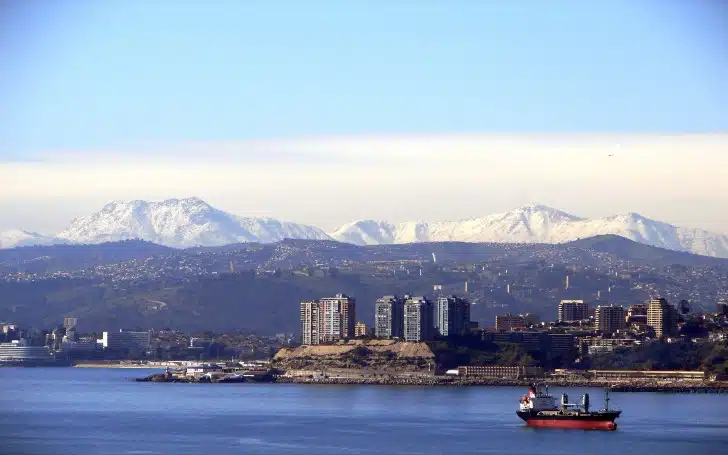Navigating the safety of any destination is crucial for a worry-free experience. Explore the question, Is Chile safe? Delve into key aspects of Chile’s safety. Chile is a safe country, but there are safety concerns such as street crime, civil unrest, travel advisory, LGBTQ+ considerations, natural disasters, traffic safety, health and hygiene, outdoor activities, and rural areas. Travelers should exercise caution, be aware of local customs, follow emergency procedures, and consider using public transportation or reputable taxi services.
Is Chile Safe?
Chile is a safe country. However, there are certain safety concerns to be aware of.
Things To Be Aware Of Concerning Chile’s Safety
#1. Crime
Street crime, such as muggings, pick-pocketing, and theft, is common in Chile. Rates of violent crime, including assaults, homicide, carjackings, and residential break-ins, are increasing.
#2. Civil Unrest
Large-scale demonstrations periodically occur in Santiago and other cities in Chile. Demonstrations can take place with little or no notice and may occasionally turn violent.
#3. Travel Advisory
The U.S. Department of State advises travelers to exercise increased caution in Chile due to crime and civil unrest. The Australian Government’s travel advice for Chile suggests reconsidering the need to travel and understanding the risks.
#4. Specific Considerations for LGBTQ+ Travelers
Homosexuality has been legal in Chile since 1993, and discrimination against LGBTQ+ people was ruled illegal in 2012. However, attitudes are slowly changing, and it is important to be aware of local customs and sensitivities.
#5. Natural Disasters
Chile is prone to natural disasters such as earthquakes, volcanic eruptions, landslides, and forest fires. It is important to familiarize yourself with emergency procedures and follow the guidance of local authorities in the event of a natural disaster.
#6. Traffic Safety
Traffic in Chile can be chaotic, especially in larger cities like Santiago. Pedestrians should be cautious when crossing roads and use designated crosswalks. Be aware of reckless driving, especially during rush hour, and consider using public transportation or reputable taxi services when possible.
#7. Health and Hygiene
Chile has a good healthcare system, but it is important to have travel insurance that covers medical expenses. Tap water is generally safe to drink in most cities, but it is advisable to drink bottled water in more remote areas. Practice good hygiene, such as washing hands regularly, to minimize the risk of illnesses.
#8. Outdoor Activities
Chile offers various outdoor activities such as hiking, trekking, and skiing. Ensure that you are adequately prepared and have proper equipment for outdoor adventures.
#9. Rural Areas
If you plan to visit rural areas or isolated regions, it is advisable to research and plan accordingly. Inform someone of your travel plans and check in with them regularly. Be mindful of potential challenges, such as limited infrastructure and communication.
#10. General Tips
Use common sense and be aware of your surroundings. Avoid displaying valuable items in public and keep your belongings secure. Stay in well-lit and populated areas, especially at night.
Is Chile Safe For Solo Female Travelers
Chile is generally considered safe for solo female travelers. While it is always important to exercise caution and be aware of your surroundings when traveling alone, there is no special risk for female travelers in Chile. However, as with any destination, it is advisable to take certain precautions to ensure a safe and enjoyable trip.
Safety Tips for Solo Female Travelers in Chile
#1. Avoid being Alone in Isolated Areas
Like in many parts of the world, it is generally recommended to avoid being alone in isolated areas, especially at night. Stick to well-populated and well-lit areas, particularly in urban areas.
#2. Be Cautious of Unwanted Attention
It is relatively common for men to make comments or gestures that are not welcome to women on the street in Chile. Stay alert and assertive, and if you feel uncomfortable, it is best to remove yourself from the situation.
#3. Use Reliable Transportation
When moving around the country, it is advisable to use reliable transportation options, such as registered taxis or reputable ride-sharing services. Avoid hitchhiking or accepting rides from strangers.
#4. Research your Accommodations
Before booking accommodations, research the safety and reputation of the area and the establishment. Choose accommodations in safe and well-reviewed neighborhoods.
#5. Stay Connected
Ensure that you have a reliable means of communication, such as a working mobile phone, and share your itinerary and contact details with a trusted friend or family member.
#6. Trust your Instincts
If something feels off or unsafe, trust your instincts and remove yourself from the situation. It is always better to prioritize your safety.
#7. Be Aware of your Belongings
Petty theft is a common concern in Chile, so it is important to be vigilant and keep an eye on your belongings.
#8.Catcalling and Attention
Women may experience catcalling and attention from men on the street and in bars, but this behavior can generally be ignored.
#9. Connect with Other Travelers
Consider connecting with other travelers, either through online platforms or local women, to share experiences and travel together.
#10. Stay Informed
Stay updated on the current situation and follow any travel advisories or recommendations provided by official sources.
Is Chile Safe To Visit?
Chile is generally a safe country to visit, but it is important to be cautious of street crime, which includes muggings and theft. Violent crime rates are increasing, and it is advisable to take precautions. Civil unrest and political volatility can occur, so it is essential to stay informed and avoid protest areas. Overall, staying informed, using caution, and exercising common sense is key to ensuring a safe trip to Chile.
Destinations To Visit In Chile
Chile offers a wide range of beautiful and diverse safe places to visit.
#1. Torres del Paine National Park
Located in southern Patagonia, this stunning national park is known for its towering granite peaks, glaciers, and pristine lakes. It is a paradise for hikers and nature lovers.
#2. Santiago
Chile’s capital city, Santiago, offers a mix of modernity and history. Explore its vibrant neighborhoods, visit museums and art galleries, and enjoy the local cuisine.
#3. Easter Island
Famous for its mysterious Moai statues, Easter Island is a remote and fascinating destination. Discover the unique Polynesian culture, explore archaeological sites, and enjoy the beautiful beaches.
#4. Valparaiso
This colorful coastal city is known for its bohemian atmosphere, street art, and historic funiculars. Explore its winding streets, visit art galleries, and enjoy panoramic views of the Pacific Ocean.
#5. San Pedro de Atacama
Located in the Atacama Desert, one of the driest places on Earth, San Pedro de Atacama offers breathtaking landscapes, including salt flats, geysers, and colorful rock formations. It is also a great spot for stargazing.
#6. Chiloe Island
Located in the south of Chile, Chiloe Island is known for its unique architecture, wooden churches, and traditional fishing villages. Explore its lush landscapes, enjoy fresh seafood, and learn about the local folklore.
#7. Chilean Lake District
This picturesque region is characterized by its stunning lakes, snow-capped volcanoes, and lush forests. It offers opportunities for outdoor activities such as hiking, kayaking, and hot springs.
#8. La Serena
Located on Chile’s northern coast, La Serena is known for its beautiful beaches, colonial architecture, and clear skies for stargazing. Visit its historic center, enjoy the beach, and explore nearby Elqui Valley, famous for its vineyards and pisco production.
#9. Puerto Varas
Located in the Chilean Lake District, Puerto Varas is a charming town known for its stunning vistas of Lake Llanquihue and the Osorno and Calbuco volcanoes. Explore its German-influenced architecture, enjoy outdoor activities like hiking and kayaking, and savor delicious local cuisine.
#10. Pucon
Another gem in the Chilean Lake District, Pucon is a popular destination for adventure seekers. Climb the Villarrica volcano, soak in natural hot springs, go white-water rafting, and enjoy the beautiful landscapes around Lake Villarrica.
Is Chile Safe For American Tourists?
Chile is considered safe for American tourists, but it’s important to be cautious and take the necessary precautions. This includes staying informed about demonstrations and civil unrest, being cautious in certain areas like Valparaiso, exercising caution in Santiago due to increased crime rates, considering health requirements, ensuring visa compliance, and staying updated on travel advisories from the U.S. Embassy. By staying informed and taking the necessary precautions, American tourists can have a safe and enjoyable trip to Chile.
Requirement For American Tourists Traveling To Chile
#1. Passport
American tourists must have a valid passport that is not set to expire before their planned departure from Chile. It is recommended to check with the Chilean Embassy or Consulate for any specific passport validity requirements.
#2. Visa
American tourists can visit Chile for up to 90 days without a visa. No visa is required for tourism purposes. However, if you plan to stay longer or for other purposes, such as work or study, you may need to apply for a visa
#3. Entry/Exit Requirements for Minors
Chile has strict requirements for the entry and exit of minors under the age of 18. Even when traveling with both parents, evidence of the relationship to the child, such as an original, apostilled, or authenticated birth certificate, may be required when departing the country.
#4. Dual Nationality
If you are a dual U.S./Chilean national, you must enter and exit Chile using your Chilean passport and enter and exit the United States using your U.S. passport. The Chilean government considers all people born in Chile to be citizens, even if they have acquired U.S. citizenship.
#5. Visa Waiver
American tourists can visit Chile for up to 90 days without a visa. This applies to tourism purposes. However, if you plan to stay longer or for other purposes, such as work or study, you may need to apply for a visa.
#6. Health Requirements
It is advisable to consult with your doctor or a travel health clinic at least a month before your trip to ensure you have the necessary vaccines or medications. While vaccines may not be required for entry into Chile, it is important to stay updated on health recommendations and take necessary precautions to stay healthy during your trip.
#7. Customs Regulations
Familiarize yourself with the customs regulations of Chile to ensure compliance with any restrictions or limitations on items you can bring into the country. Check with the Chilean Embassy or Consulate for specific information on customs requirements.
#8. Proof of Sufficient Funds
It is advisable to carry proof of sufficient funds to cover your expenses during your stay in Chile. This can include bank statements, credit card statements, or traveler’s checks.
#9. Driver’s License and International Driving Permit (IDP)
If you plan to drive in Chile, you will need a valid driver’s license from your home country. It is recommended to obtain an International Driving Permit (IDP) as well, which serves as a translation of your driver’s license and can be helpful if you encounter any issues with local authorities.
Chile has implemented an Electronic Travel Authorization (ETA) system for some nationalities, including the United States. The ETA is an online form that needs to be completed before travel. Check the official Chilean ETA website for more information and to apply if required.
How Safe Is Chile For Tourists?
Chile is safe for tourists, with a low crime rate compared to other countries in the region. However, it is important to be cautious during political unrest, practice urban safety measures, drive defensively, and be prepared for natural disasters. Stay informed, follow travel advisories, and take necessary precautions for a safe trip.
Do They Speak English In Chile?
English is not widely spoken in Chile. While some younger people, particularly those in their 20s and 30s, may have some basic knowledge of English, their overall English proficiency is limited. Fluency in English tends to be more prevalent among the upper classes or in specific industries, such as tourism. In major tourist areas, hotels, restaurants, and major tourist locations, you are more likely to find English-speaking staff. However, outside of these areas, it is advisable to have some basic knowledge of Spanish or use translation tools to communicate effectively. Learning a few essential Spanish phrases can greatly enhance your experience while traveling in Chile.
Is Chile Very Expensive?
Chile is considered to be relatively expensive compared to other countries in South America. The cost of living, accommodation, and dining out can be higher than in neighboring countries. However, the overall cost of a trip to Chile will depend on various factors, such as your travel style, accommodation choices, and activities.
Do I Need A Visa For Chile?
If you are a tourist planning to visit Chile, you generally do not need a visa for a stay of up to 90 days. Upon arrival, you will receive a Tourist Card (Tarjeta de Turismo) that is valid for up to 90 days. This card can be extended for another 90 days by paying a fee at the Chilean Immigration Office. It is important to return the Tourist Card upon departure, as failure to do so may result in delays or fines.
Is Chile Rich Or Poor?
Chile is a country with significant income inequality. While it has experienced economic growth and development in recent years, there is a notable gap between the rich and the poor. Chile ranks as one of the most unequal countries among a group of the world’s wealthiest nations, according to the Gini index, which measures income inequality. However, it is important to note that Chile is not classified as a poor country. It has made progress in reducing poverty rates and has seen improvements in various socio-economic indicators.
Are Us Dollars Accepted In Chile?
US dollars are not widely accepted in Chile, except in some hotels and more touristic areas. It is recommended to have Chilean pesos in cash for most transactions. While major credit and debit cards are accepted in many places, smaller shops, kiosks, and more informal restaurants in remote areas may only accept cash. It is advisable to withdraw pesos from ATMs upon arrival or carry a small amount of US dollars that can be easily exchanged for local currency.
Conclusion
Chile is generally safe for solo female travelers, but it’s important to avoid isolated areas, be cautious of unwanted attention, use reliable transportation, research accommodations, and stay connected. Chile is a safe country to visit, but be cautious of street crime and civil unrest. So, Chile is considered safe for American tourists, but caution is advised. To ensure a safe trip, American tourists must have a valid passport and a valid visa and meet entry and exit requirements for minors. If a dual U.S. or Chilean national, they must use their Chilean passport and U.S. passport for entry and exit.
- IS KENYA SAFE? Everything You Need To Know
- IS IT SAFE TO TRAVEL? All You Need To Know
- IS MAURITIUS SAFE? All You Need To Know
- IS TANZANIA SAFE? All You Need To Know
- IS MOROCCO SAFE FOR AMERICANS?


